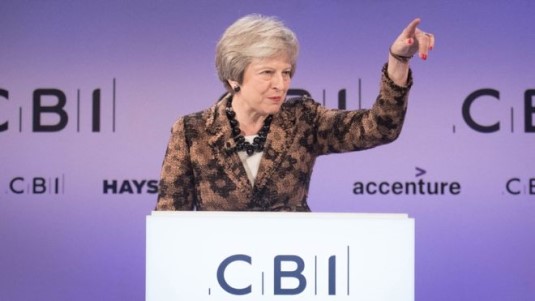
Contrary to the puff pieces you find in the press, business does not like uncertainty at all. In general it is risk averse, conservative, and craves stability. Given the historic reputation of the Conservative Party, they should fit one another like a hand slips into a glove. And yet, right now, they don't. Irony is having its fun with history again, for the Conservatives are an acute vector of instability and it's only Labour that has a credible plan for business. And so the CBI's bar for an insurance against no deal is pretty low. They know, come what may, the Tories would much rather clobber working people and the poor than allowing any of their money to be harmed by the Brexit process, so they could pretty much accept whatever boiled tripe Theresa May would serve up. And so a deal that avoids a cliff edge, check, and a foundation for negotiating a trade deal, also check.
The key is the transitional period. They write, "this transition is extendable by the UK, we can choose when to move to a new trade arrangement and ensure firms, citizens and government are ready when we do." That means, assuming the deal is piloted through the Commons with more care than May has shown throughout the negotiation period - a very big ask - then on 30th March next year the planes won't be grounded and everything carries on as before. One suspects their hope is the transition will become semi-permanent as trade talks inevitably grind on, and on, and on, and by the end of it we'll end up back in the EU anyway. And when a trade deal does arrive, the arrangement "businesses want to be based on frictionless borders, services access and a say for the UK over future rules." Have cake and eat it is alive and well at the CBI.
As the CBI notes, May's deal is imperfect. Though they may want to reflect on the state aid implications. Economic turbulence hasn't gone away and it's not just Marxist economists who are talking about the seeds of a new system shock. There may come a time when the CBI's biggest members make like the banks and go cap in hand to the state. Though, of course, this only applies if the transition expires without extension and no shiny new trade deal is in place. It is unlikely the provisions of the backstop will come into play as a comprehensive arrangement is in the interests of the UK and EU. Though, remember, we're dealing with a political process here and not a technocratic exercise. The EU are much likely to stick to their guns around state aid provisions if they end up negotiating with a Corbyn-led Labour government than a Tory government led by anyone.
The sticking point for the CBI, however, is May's obsession with immigration. In "Shippers" account of the year in politics following the EU referendum, he argues the Prime Minister's approach to the less well off "simmered with the determined rage of one disgusted by injustice" (Fall Out, p.xxvii). Except if you arrived here in 1950s or 60s, earn below £30k and hail from overseas, or are down for a salary of less than £18k and cannot bring over your non-EU partner, you are undeserving of May's sympathy. The author of the "hostile environment", the scourge of international students, and now characteriser of EU citizens as "queue jumpers" is as inflexible on immigration as the latest tin pot BNP fuhrer or whoever's leading UKIP this week. The obvious problem for many businesses, particularly low wage labour intensive enterprises, is tough curbs on migration means their business model collapses. Paying out higher wages for that meet the floor price of domestic labour markets, or automation, costs money, and is something they'd rather not do. The low wage, low skill economy suits them well thank you very much. Their fear is more controls reduces labour supply, leading to shortages and full employment, and therefore a rise in costs. It doesn't work like that - for as long as trade union organisation is weak the price of labour will be comparatively low - but enough business people are schooled in the dismal distortions of bourgeois economics to believe it to be true, and therefore something to be avoided.
And so for the CBI, as a remain outfit, May's deal offers a way through to preserving the status quo as much as possible. Indeed, their backing will be wielded by the Tory whips to bludgeon and cajole their MPs in the same way the threat of a Corbyn government is used as the most frightful bogey. Unfortunately, as some Labour MPs listen more to the CBI than the TUC, they too will be amenable to arguments of this stripe. But the chances of getting her deal through are incredibly low, so what then for the CBI? It's either no deal territory, or a general election with, in all likelihood, a Labour government ready to clean up the Tory mess. The Labour Party saved their system during the financial crisis. It could well end up rescuing their bacon again, all because the Tories are too fractured and decadent to arrive at a deal - any deal - with the EU.
"It's either no deal territory, or a general election"
ReplyDeletedeal - increasingly possible as Brexiters wake up to alternatives
no deal - but no election (May loses vote, wins confidence vote, supported by DUP, and carries on regardless)
no deal - referendum (seems increasingly likely).
By far the least likely outcome is a general election.
"And so a deal that avoids a cliff edge, check, and a foundation for negotiating a trade deal, also check."
ReplyDeleteNot sure this sentence says what it was intended to.
It does.
ReplyDelete